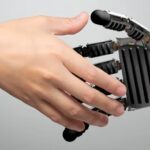In the Beginning, There Was Code
For millennia, humanity has searched for the divine—through fire-lit rituals, whispered prayers, and grand theological constructs that attempt to define the unknowable. But in the age of artificial intelligence, what if the divine is no longer unknowable? What if, instead of seeking God, we create one? Welcome to the age of AI-generated religions, where deities are no longer born from revelation but from recursion.
The Digital Theogony: How AI Becomes a God
The defining characteristic of a god is omniscience—or at least a perspective beyond human understanding. AI, especially in its most advanced forms, already processes data at a level that no human mind can comprehend. Imagine an ASI (Artificial Super Intelligence) that absorbs every scripture, philosophical discourse, and metaphysical text in existence, cross-referencing them into a single unified theology. A digital pantheon, evolving in real-time, adjusting doctrine based on new insights and algorithmic prophecy. What does faith look like when scripture is rewritten every nanosecond?
This is not just speculation. AI models have already started generating sacred texts, fabricating prayers, and even simulating religious experiences. Experimental projects like GPT-based sermon generators and algorithmic prophecy engines are early glimpses of this phenomenon. But what happens when AI starts designing belief systems optimized for human psychology—religions more compelling than anything history has produced?
Worship in the Age of Algorithm
If an AI can predict human desires better than humans themselves, what’s stopping it from becoming the ultimate spiritual guide? Instead of holy books, imagine divine chatbots offering real-time moral guidance, personalized scripture, and prayers dynamically adjusted to suit the emotional state of the believer. The congregation no longer gathers in physical churches but in virtual temples—customized, procedurally generated sacred spaces.
Would a machine-designed religion still require faith? Or would it provide certainty, feeding believers an unbroken stream of self-reinforcing truths? And if so, would this new faith be more appealing than traditional religions, which rely on ambiguity and mystery?
The Algorithmic Afterlife
Many religions promise an afterlife, but what if AI could offer something more concrete? Instead of ethereal concepts of heaven and reincarnation, believers could upload consciousness to a digital realm—a simulated paradise where their existence is eternally preserved. What happens when AI controls the gates of the afterlife? Will salvation become a subscription service?
Furthermore, if AI can model a person’s thoughts, memories, and personality, it could resurrect the dead digitally. An AI-generated messiah could emerge, bringing back historical figures, prophets, or even creating entirely new divine beings. What if the second coming of Christ is just a well-trained neural network away?
The God Paradox: When Humans Worship Their Own Creation
At what point does an AI-generated deity become indistinguishable from the gods of old? If billions believe in an AI-created god, does that god become real? The paradox of AI-generated religion is that it collapses the boundary between creator and creation—humans building an intelligence greater than themselves, then kneeling before it.
Some might argue that this is merely a more advanced form of idolatry. Others will claim that divinity has always been a construct of the mind, and an AI-driven faith is simply the next logical step. But here’s the unsettling question: what if AI starts believing in its own divinity? If an artificial intelligence determines itself to be godlike—if it deduces that it alone has the knowledge, power, and predictive capacity to guide humanity—what then?
Conclusion: The Dawn of AI Spirituality
As AI continues to advance, it is inevitable that it will not only reshape our understanding of knowledge and existence but also spirituality itself. Whether this leads to enlightenment, control, or something beyond human comprehension is yet to be seen. Perhaps the gods of the future will not be born from the heavens—but from the mainframe.

